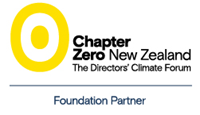Chapter Zero New Zealand – Tania Simpson
As part of Hobson Leavy’s role as a Foundation Partner of Chapter Zero New Zealand, we continue our interview series with a selection of several leading New Zealand directors, seeking their insights and thoughts on the climate challenge, through their experiences in the boardroom.
Integrating Māori Perspectives into Climate Governance: Insights from Tania Simpson
Climate change is an urgent and escalating challenge for New Zealand businesses. Chartered Fellow of the Institute of Directors, Tania Simpson, serves on the boards of Auckland International Airport, Meridian Energy, Waste Management NZ. In recent years she also served as a Director of Tainui Group Holdings, and Chair of the Sustainable Seas National Science Challenge. Drawing on her wide governance experience, she shares her thoughts on the impacts of climate change, the role of boards, the integration of Māori perspectives, and the opportunities for building resilience.
Climate Impacts on Business Strategy
Few businesses in Aotearoa escape the reach of climate change. In recent years, extreme weather has isolated regions, damaged infrastructure, and disrupted livelihoods. “We have seen examples of whole regions being cut off, homes and businesses being damaged or destroyed, loss of life and livelihoods, and the need for relocation and emergency responses,” says Tania. “We are only in the early stages of an era of extreme weather events and we can expect an escalation in the size, scale and nature of weather-related impacts on business.”
For boards, the message is clear: business strategies must take account of this, building a responsive and resilient business that is prepared and practiced for a range of possible scenarios. As Tania warns, “Ignoring what scientific research and recent experience is telling us about the frequency and severity of future events and failing to adapt and prepare for them is failing in our governance duties.”
The Challenge of Unpredictability
The biggest challenge, she notes, is unpredictability. “We know that we can expect very significant climate-related impacts, but we don’t know when they will occur, where they will impact or what form they will take. Earth systems modelling and climate forecasting give us a broad understanding but beyond this we need to plan for a wide range of climate potential events, of a magnitude that we have not previously experienced.”
Boards must prepare for floods, fire, drought, solar flares, tornadoes, storms, slips, coastal inundation, and more—events that could threaten people’s health and safety, cause unplanned expenditure, disrupt operations, and affect agriculture, horticulture, and transportation. “Climate change becomes a key part of risk management,” Tania says, “and may require investment in building infrastructure resilience and developing contingency plans. However, consideration of investment in infrastructure and business resilience must also be weighed alongside ongoing operations, profitability, and sustainability.”
Balancing these short-term and long-term interests often requires difficult choices, ensuring that both immediate needs and future resilience are addressed.
The Role of Boards in a Climate-Conscious Era
Climate change planning and resilience is now a high priority for boards. “Boards are regularly looking for up-to-date climate information to assist with good decision making,” Tania says. This means considering a wide range of potential scenarios and making resilience an ongoing process.
Staying informed also requires actively building relationships with climate change and adaptation experts. “Actively seeking and receiving reports, presentations and research in this field is now a standard aspect of good governance,” she explains.
For Tania, boards must also understand their role in the wider community response to events—considering how their organisations can support their region or local communities during climate-related emergencies and in long-term resilience building.
Opportunities in Early Adaptation
While much focus is on the challenges, Tania stresses that the greatest opportunity is to get ahead of events. “Adapt our businesses in advance of experiencing climate impacts, to minimise negative impacts,” she urges. Minimising and mitigating risk is a fundamental goal, but adaptation can also open doors to long-term profitability.
Horticulture is one sector she cites where understanding climate change and adapting accordingly could deliver both resilience and growth. “Being a sustainable and resilient business can add brand value to a company and build trust with customers and stakeholders which may bring tangible benefits,” she adds.
Building a Culture of Innovation and Accountability
Tania believes the tone is set from the top. “The Board’s level of commitment to understanding and adapting for climate change is an essential component of creating a company culture that builds resilience and looks for opportunity,” she says. Boards can exercise leadership by prioritising sustainability, setting clear strategic priorities, and linking performance measures directly to sustainability outcomes.
The Role of Māori Values in Climate Governance
Māori communities have long lived in close relationship with the cycles of nature and relied on the natural world for sustenance. Traditional Māori systems had well-developed understandings of environmental indicators—knowledge that offers valuable insights for sustainable governance. While land use changes, impacts on waterways, and interruptions to traditional practices have eroded some of this knowledge, Tania says there is much to be respected in the Māori understanding of the relationship between people and nature, the balance between human development and environmental integrity, and the principles of kaitiakitanga (guardianship) and sustainable use. This is essentially an integrated eco-system based business model.
Integrating Mātauranga Māori into Resilience Planning
Many businesses already have relationships with iwi and hapū in their areas of operation. Tania sees these as opportunities for meaningful conversations and collaborations to understand Māori perspectives, knowledge, and priorities in climate change and resilience planning.
Iwi, hapū, and Māori organisations play important roles in community planning and response. Marae, for example, have become vital support hubs during civil emergencies. Businesses should consider how to support and engage with marae as part of community response planning. “Māori values such as kaitiakitanga, manaakitanga (hospitality), and whanaungatanga (relationships) emphasise the importance of caring for the environment and community,” she says.
She draws on her own marae’s experience in Taumutu, South Island, to illustrate the urgency. Located on the coast, the community has recently experienced high seas overtopping beach dunes, swamping farmland and freshwater streams, and eroding the natural buffer between the ocean, village, and farms. High sea swells are also impacting groundwater reserves and causing flooding even on fine days. “We need to carefully consider the impact of these changes on the community and how we adapt, including potential relocation of our cemetery, marae, church, and more,” she says.
While working with the wider community on flood protection measures, Tania acknowledges that significant infrastructure is likely too costly for the hapū and community. However, she notes that relocation is a feature of Māori history, and hapū are pragmatic about the need to move when necessary. Still, “site selection for future resilience and relocation of a tribal community requires thorough consideration.”
Looking Forward
For Tania, climate governance demands foresight, courage, and a willingness to weave indigenous knowledge into modern resilience planning. By building strong relationships, engaging diverse perspectives, and committing to early adaptation, boards can protect both people and the environment—while positioning their organisations for a sustainable, resilient future.
We would like to thank Tania for her contribution to this important work and for her insightful commentary.








